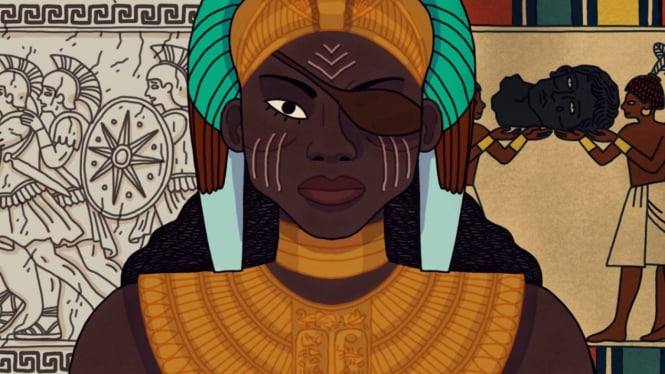All about the One-Eyed Queen Who Defeated Roman Empire
- Narratively site
VIVA – All about the Kushite Queen Amanirenas or known as one-eyed queen who focuses on a conflict that began in 30 BC, shortly after the first Roman Emperor occupied Egypt. After more than a thousand years of ruling the region, the Kingdom of Kush disappeared in 300 AD.
The threat of the entire Roman Empire and the deified Roman Emperor himself could not break the resolve of the organized tribes living in Northeast Africa, south of Egypt. Rome's penchant for war could only go so far against a nation that swore never to submit.
Although Rome endured for centuries, the question of Kush's sovereignty was never questioned again, all thanks to this fierce warrior queen who shredded gender discrimination with ease.
Kingdom of Kush
Kaisar Romawi
At one point around 750 BC Kush conquered Egypt, and the Kushite ruler Piye declared himself Pharaoh and invested in the revival of the construction of the Pyramids.
Assyria in 672 BC liberated Egypt but could not obliterate Kush due to the hundreds of miles of desert between Meroë and Egypt; an obstacle that Rome later faced.
Valuable gold mines were present in the Kush region, and the powerhouse was in the capital city of Meroe. The former capital was Napata, 150 miles to the north. Finally, because gender discrimination did not exist in Kush, the female queen, called kandakes, received military training and everyone respected her as a goddess.
Rome's push into Egypt
Drama and strife brought Roman legions to North Africa, and Emperor Augustus took control of Egypt after the end of the Ptolemaic dynasty. The end of this dynasty was an ancient drama; Mark Antony and Cleopatra fell in love, respectively Roman Consul and Queen of Egypt, and Rome declared war on the couple.
As defeat approached, the couple committed suicide which allowed Rome to occupy Egypt on August 30 BC. To secure the territory, Augustus sent several legions under the leadership of Gaius Cornelius Gallus.
Gallus committed suicide after Augustus punished him for glorifying himself by building a monument in his honor instead of Augustus. Aelius Gallus succeeded Gaius and his failed expedition to Arabia in 25 BC left Egypt vulnerable. Gaius also imposed tribute and taxes on the southern Egyptian provinces, some of which included the village of Kush, which resented this sudden oppression.
The first conflict
The frustration in the Roman-Egyptian leadership after the suicide of Gaius created a vulnerability that the Kingdom of Kush knew they could exploit. In addition, Aelius' reallocation of troops to Arabia left the southern stretch of Egypt unguarded.
In 24 BC, Queen Amanirenas and King Teriteqas led 30,000 soldiers into Roman territory and eliminated the only resistance they faced at a garrison in Philae. The King and Queen's soldiers looted treasures, took Roman citizens captive, and beheaded a statue of Emperor Augustus.
Found in 1910, the bronze head was underneath a southern Kush temple, a gesture that meant every visitor trampled on Augustus' head. However, shortly after the war between Rome and Kush began, Queen Amanirenas' husband, King Teriteqas, died.
During the conflict, a Roman soldier maimed her eyesight, which is why Strabo described her as a "masculine woman... who lost one eye". This combination of prowess with masculinity was symptomatic of Roman culture's sexist view of feminine traits, and Amanirenas' success challenged their assumptions.
The final peace
While the Napata invasion was a success for the Cushites, the queen suffered, losing her husband and son during the hostilities. In 22 BC, allied Kushite forces besieged Petronius in the city of Primis, and the Roman governor requested the queen visit Emperor Augustus to negotiate peace.
She sent envoys in his stead, which was unusual for such a small kingdom when dealing with Rome, but this was her way of expressing her power. While Augustus focused on the greater threat from Parthia, he received Amanirenas' envoy.
They sent her a bundle of golden arrows: a gift for a friend, or "the weapon Rome needs" if she refused the Kushite demand. In honor of Queen Amanirenas,the one-eyed queen, Augustus agreed to her demands.
The peace treaty of 21 BC resulted in Rome withdrawing troops and remitting tax claims from occupied Kushite territory, and in addition, Rome recognized the kingdom as sovereign. This victory signaled one of the very few small regional leaders, a Queen in a patriarchal world, defeating the might of Rome.





















